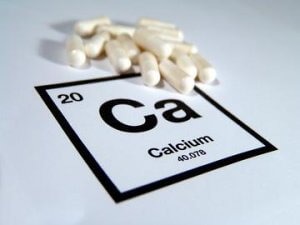Calcium
What Is It?
Calcium is one of the most important minerals to human health. Your body contains more of it than any other mineral. In fact, it makes up about 1-2% of your total body weight. Calcium is critically important to your health in many ways, and it’s often difficult to get enough from diet alone. In fact, the Surgeon General’s office has estimated that as many as 80% of Americans get less than adequate amounts of calcium in their diets.[1]
Calcium supplements can come in several different forms: calcium carbonate, calcium citrate, and calcium citrate malate are the most common.
How Does Your Body Use It?
 Calcium is required for vascular contraction and vasodilation, muscle function, nerve transmission, intracellular signaling and hormonal secretion, though less than 1% of total body calcium is needed to support these critical metabolic functions.[2]
Calcium is required for vascular contraction and vasodilation, muscle function, nerve transmission, intracellular signaling and hormonal secretion, though less than 1% of total body calcium is needed to support these critical metabolic functions.[2]
The other 99% of the calcium in your body is used to make up your bones and teeth.[3]
Why People Take It
Calcium is one of the most popular dietary supplements. Doctors often provide calcium supplement recommendations, especially for women as they get older.
Human bones undergo a constant process of remodeling. In this process, mature bone tissue is removed and new tissue is formed.[4] This process changes with age, and as we get older new bone tissue is formed faster than old tissue can be removed. This leads to bone loss, and the risk of osteoporisis.[1] Calcium supplements have been found to decrease this risk.[5]
Some people also take calcium to lessen the effects of premenstrual syndrome (PMS), leg cramps in pregnancy, high blood pressure in pregnancy (pre-eclampsia), and reducing the risk of colon and rectal cancers.
Are There Negatives or Side Effects?
Some people occasionally experience some gas and bloating when they begin taking a new calcium supplement. These effects are minor and usually go away in a fairly short amount of time. Of course, you’ll experience less of this if your calcium supplement is properly balanced with the correct ratio of magnesium.
More serious side effects include:
Heart attacks and other cardiovascular problems. Some studies have indicated calcium supplements may lead to an increased risk of heart attacks and other cardiovascular events.
The increased risk has been noted with supplements in the form of both calcium carbonate and calcium citrate, and especially with supplements that contain no calcium supporting ingredients.[6]
Kidney Stones. Calcium supplements can lead to an increased risk of kidney stones – again depending on the form you take. Calcium citrate and carbonate are the most frequent offenders.[7]
Arthritis. Arthiritis sufferers occasionally notice increased pain and swelling in their joints when taking certain forms of calcium supplements. Again, Calcium carbonate is the most frequent offender.[8]
How To Choose A Supplement
In order to minimize the potential side effects listed above, the first recommendation is to choose the form of calcium least likely to cause them. In this case, calicum citrate malate (sometimes known as calcium citramate)[7].
Studies have also suggested several calcium supporting ingredients to not only minimize side effects, but maximize overall effectiveness and absorption of calcium. These include:
An ideal calcium supplement will contain all of these ingredients. For more information on choosing a calcium supplement, see our Calcium Supplement Recommendations.
See Also:
- ^ U.S. Department of Health and Human Services. The Surgeon General’s Report on Bone Health and Osteoporosis: What It Means To You. U.S. Department of Health and Human Services, Office of the Surgeon General, 2012.
- ^ Committee to Review Dietary Reference Intakes for Vitamin D and Calcium, Food and Nutrition Board, Institute of Medicine. Dietary Reference Intakes for Calcium and Vitamin D. Washington, DC: National Academy Press, 2010.
- ^ Cochrane Database Syst Rev. 2004;(1):CD004526. Calcium supplementation on bone loss in postmenopausal women. Shea B, Wells G, Cranney A, Zytaruk N, Robinson V, Griffith L, Hamel C, Ortiz Z, Peterson J, Adachi J, Tugwell P, Guyatt G; Osteoporosis Methodology Group; Osteoporosis Research Advisory Group.
- ^ Hadjidakis, Dimitrios J., and Ioannis I. Androulakis. “Bone remodeling.” Annals of the New York Academy of Sciences 1092.1 (2006): 385-396.
- ^ Cranney A, Horsley T, O’Donnell S, Weiler HA, Puil L, Ooi DS, Atkinson SA, Ward LM, Moher D, Hanley DA, Fang M, Yazdi F, Garritty C, Sampson M, Barrowman N, Tsertsvadze A, Mamaladze V. Effectiveness and Safety of Vitamin D in Relation to Bone Health. Evidence Report/Technology Assessment No. 158 (Prepared by the University of Ottawa Evidence-based Practice Center (UO-EPC) under Contract No. 290-02-0021. AHRQ Publication No. 07-E013. Rockville, MD: Agency for Healthcare Research and Quality. August 2007.
- ^ Bolland, Mark J., et al. “Effect of calcium supplements on risk of myocardial infarction and cardiovascular events: meta-analysis.” BMJ: British Medical Journal 341 (2010).
- ^ Reinwald, Susan, Connie M. Weaver, and Jeffrey J. Kester. “The health benefits of calcium citrate malate: a review of the supporting science.” Advances in food and nutrition research 54 (2008): 219-346.
- ^ Reid, D. M., et al. “Total body calcium in rheumatoid arthritis: effects of disease activity and corticosteroid treatment.” BMj 285.6338 (1982): 330-332.
- ^ Wasserman, R. H. “Vitamin D and the dual processes of intestinal calcium absorption.” The Journal of nutrition 134.11 (2004): 3137-3139.
- ^ Fuchs, Nan Kathryn. “Magnesium: A Key to Calcium Absorption.” The Magnesium Website. November (2002).
- ^ Morcos, S. R., et al. “Effect of vitamin C and carotene on the absorption of calcium from the intestine.” Zeitschrift für Ernährungswissenschaft 15.4 (1976): 387-390.
- ^ Knapen, Marjo HJ, Karly Hamulyák, and Cees Vermeer. “The effect of vitamin K supplementation on circulating osteocalcin (bone Gla protein) and urinary calcium excretion.” Annals of internal medicine 111.12 (1989): 1001-1005.
- ^ Civitelli, Robert, et al. “Dietary L-lysine and calcium metabolism in humans.” Nutrition (Burbank, Los Angeles County, Calif.) 8.6 (1991): 400-405.
